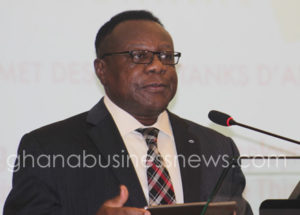The issue of youth unemployment to dominate ACBF Board Meetings in Cameroon

The situation of youth unemployment in Africa has been described in many terms as the continent’s waiting time bomb, the greatest threat and the next explosion. The growing youth population has also been described as an opportunity.
In the coming week, the sensitive issue will take centre-stage at this year’s Board of Governors Meeting of the African Capacity Building Foundation (ACBF) taking place in the Cameroonian capital, Yaoundé.
About 250 participants, including private sector operators, ACBF’s technical partners, and youth representatives from member countries are expected to join the Board of Governors, the highest decision-making body of the ACBF to diagnose the chosen theme “Youth Employment in Africa: A Focus on Developing the Critical Skills.”.
The ACBF is the African Union’s specialized agency for capacity development and over the years, it has through NGOs, funded a number of capacity building and technical interventions aimed at strengthening the continent’s ability to address some of its peculiar socio-economic challenges.
The Board comprises African member-countries, non-regional funding partners, and founding institutional members such as the African Development Bank (AfDB), the United Nations Development Programme (UNDP), and the World Bank. The ACBF’s Executive Secretary, Prof. Emmanuel Nnadozie, will also be leading the Foundation’s management team to the 27th Annual Meeting from 19 July to 20 July 2018 which is expected to take some far-reaching decisions.
The official opening of the meeting will be under the patronage of President Paul Biya of the Cameroon and the Host Governor, Alamine Ousmane Mey, Minister for Economy, Planning and Regional Development who will give the Welcome Remarks. Goodall Gondwe, the Minister of Finance, Economic Planning and Development for Malawi, who is the current Chair of the ACBF Board of Governors and Mr. Erastus Mwencha, who is the current Chair of the ACBF Executive Board will share some remarks at the opening ceremony.
The meeting will be preceded by a High-Level Forum where experts will share experiences and knowledge on the various strategies and innovations aimed at tackling youth employment issues on the continent.
It is hoped that at the end of the forum, participants will have a better understanding of the skills required to tackle youth unemployment in African countries and mobilize support for ACBF’s work in building the capacity to tackle youth unemployment.
The International Labour Organisation (ILO) in 2016 said Africa continues to be confronted with high levels of unemployment, vulnerable employment and working poverty with little signs of potential recovery.
In its World Employment and Social Outlook (2016), the ILO observed that trends have shown that the global number of unemployed youth is set to rise by half a million in 2017 to reach 71 million, the first such increase in three years.
With a youth population that is expected to double, to over 830 million by 2050 in the whole continent, the incidence of unemployment among youth in Northern Africa remains elevated at 29.3 per cent in 2016, representing the second highest rate across all regions.
The research discloses that the youth unemployment rate in sub-Saharan Africa is expected to continue on its downward trajectory, which began in 2012, reaching 10.9 per cent in 2016 and decreasing slightly to 10.8 per cent in the following year. However, the unemployment outlook for youth in major countries of the region remains quite mixed. In South Africa, more than half of all active youth are expected to remain unemployed in 2016, representing the highest youth unemployment rate in the region.
Tony Elumelu, one of the continent’s celebrated entrepreneurs has said that one of the greatest challenges facing Africa remains youth unemployment.
“When I was growing up, I was inspired by seeing other young people going to university, graduating and then getting a job with a Nigerian company where they could develop and work their way up,” says Elumelu. “But now those days are gone. Unemployed young people will likely be Africa’s greatest challenge over the next 30 years.
“Today, the economies of many African countries are not as strong as they were, more and more young Africans are joining a depressed job market, and we even have educated people struggling to find a job.”
Unemployment among young people aged 15–24 years old in sub-Saharan Africa has hovered between 12 per cent and 14 per cent since the global financial crisis of 2008. This is higher than the 9–10 per cent in South Asia over the same period, according to World Bank statistics.
The ACBF Forum in Yaoundé is therefore expected to highlight good practices and lessons learned in developing critical technical skills required to combat youth unemployment in Africa.
By Emmanuel J. K. Arthur
Copyright ©2018 by Creative Imaginations Publicity
All rights reserved. This article or any portion thereof may not be reproduced or used in any manner whatsoever without the express written permission of the publisher except for the use of brief quotations in reviews.
